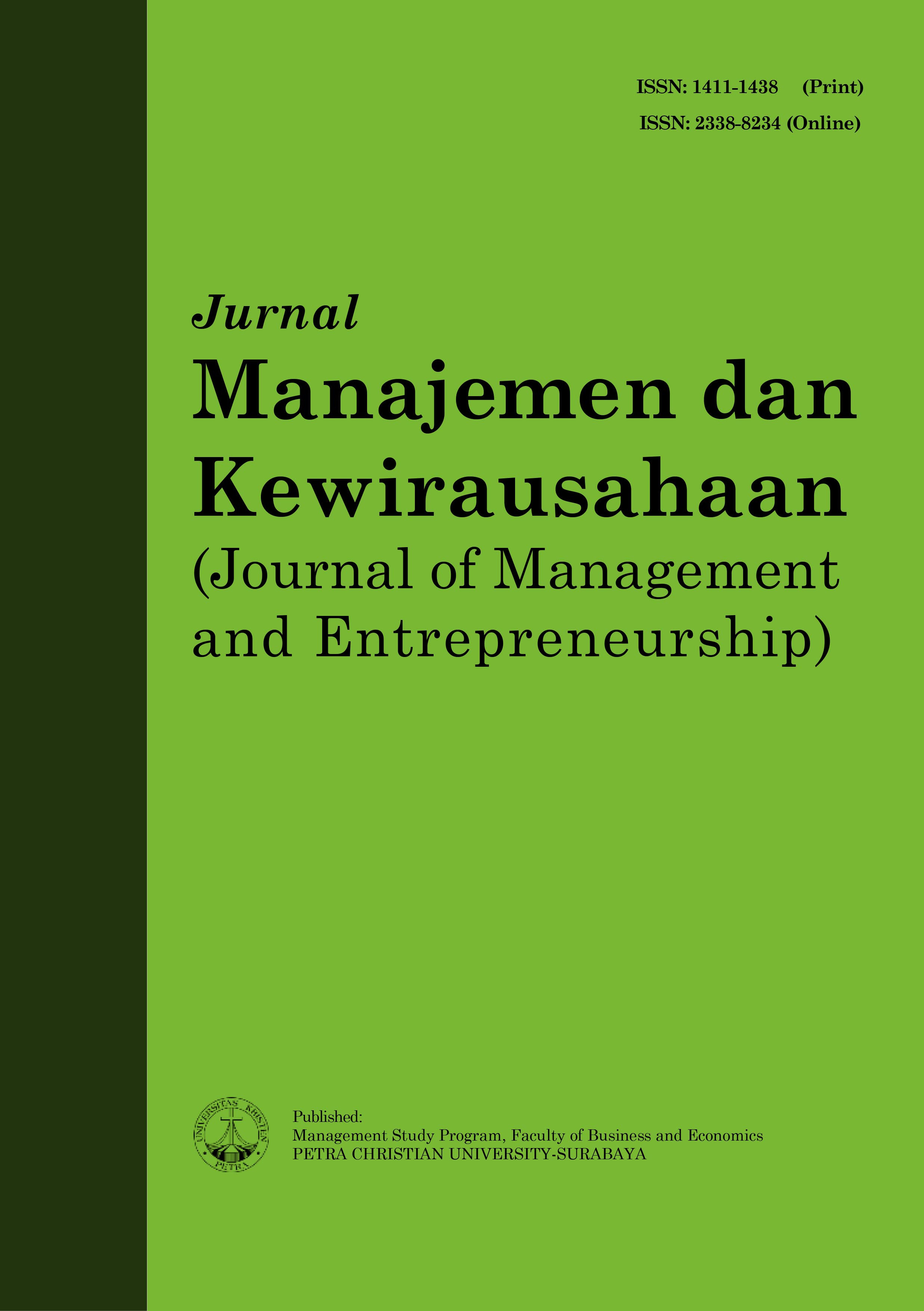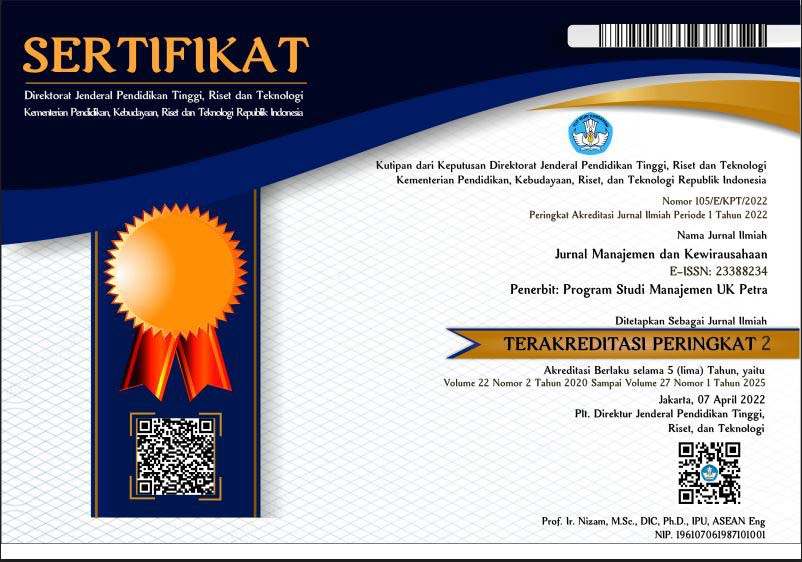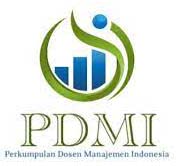SUSTAINABLE LEADERSHIP KEY FACTORS: STUDY ON PROFIT AND NON PROFIT ORGANISATIONS IN BATAM INDONESIA
DOI:
https://doi.org/10.9744/jmk.22.2.122-130Keywords:
Leadership, Human Resources, Sustainable.Abstract
The purpose of this study is to examine the main factors forming sustainable leadership in organizations. The sampling method of this study was simple random sampling, which got as many as 289 employees or members of organizations in the city of Batam. Principal Component Analysis is used in the process of analyzing the data of this study using statistical programming tools in R and RStudio. The results of this study are the Sustainability Leadership of Human Resources in the organization formed by 4 factors, namely factor 1- Harmony Leadership, factor 2- Ethical Leadership, factor 3- Personal value Leadership and factor 4- Care Leadership.
References
Akingbola, K., Rogerrs, & Baluch, A. (2019). Evaluating Change In Nonprofit Organizations. In: Change Management in nonprofit Organizations. Palgrave Macmillan, Cham.
Al-sharafi, H., & Rajiani, I. (2013). Promoting Organizational Citizenship Behaviour among Employees: The Role of Leadership Practices. International Journal of Business and Management, 8, 47–54.
Barbuto, J. E., & Wheeler, D. W. (2006). Scale Development and Construct Clarification of Servant Leadership. Group & Organization Management, 31(3), 300–326.
Brown, M. E., Treviño, L. K., & Harrison, D. A. (2005). Ethical leadership: A social learning perspective for construct development and testing. Organizational Behavior and Human Decision Processes, 97(2), 117–134. https://doi.org/10.1016/j.obhdp.2005.03.002
Chasanah, F. N. (2017). Analisis Pengaruh Kepemimpinan Yang Melayani (Servant Leadership) Terhadap Kinerja karyawan Dengan Komitmen Organisasi Sebagai Variabel Intervening Studi Kasus Karyawan Home Industry Batik Merak Manis Surakarta. Institut Agama Islam Negeri Surakarta.
Christensen-Salem, A., Walumbwa, F. O., Babalola, M. T., Guo, L., & Misati, E. (2020). A Multilevel Analysis of the Relationship Between Ethical Leadership and Ostracism: The Roles of Relational Climate, Employee Mindfulness, and Work Unit Structure. Journal of Business Ethics. https://doi.org/10.1007/s10551-020-04424-5
Creswell, J. W. (2005). Educational Research: Planning, Conducting, and Evaluating Quantitative and Qualitative Research. Pearson: Merrill Prentice Hall.
Di Fabio, A., & Peiró, J. M. (2018). Human Capital Sustainability Leadership to Promote Sustainable Development and Healthy Organizations: A New Scale. Sustainability, 10(7).
Ehrhart, M. G. (2004). Leadership and procedural justice climate as antecedents of unit-level organizational citizenship behavior. Pers. Psychol, 57, 61–94.
Gallagher, A., & Tschudin, V. (2010). Educating for ethical leadership. Nurse Educ, 30, 224–227.
George, B. (2012). Mindfulness helps you become a better leader. Harvard. Bus. Rev, 26, 21–32.
Hitt, M. A., & Duane, R. (2002). The Essence of Strategic Leadership: Managing Human and Social Capital. Journal of Leadership & Organizational Studies., 9, 3–14.
Jennex, M. E. (2015). Literature reviews and the review process: An editor-in-chief’s perspective. Communications of the Association for Information Systems, 36(1), 139–146.
Jolliffe, I. T. (1986). Principal Component Analysis and Factor Analysis. Dalam Principal Component Analysis. Springer. https://doi.org/10.1007/978-1-4757-1904-8_7
Kalshoven, K., Den Hartog, D. N., & De Hoogh, A. H. B. (2011). Ethical leadership at work questionnaire (ELW): Development and validation of a multidimensional measure. The Leadership Quarterly, 22(1), 51–69. https://doi.org/10.1016/j.leaqua.2010.12.007
Lange, S., & Rowold, J. (2019). Mindful leadership: Evaluation of a mindfulness-based leader intervention. Gruppe. Interaktion. Organisation. Zeitschrift für Angewandte Organisationspsychologie (GIO), 50(3), 319–335. https://doi.org/10.1007/s11612-019-00482-0
Leek, J. (2019). Decentralization policies concerning leadership of parents and students in school councils in Poland. From autocracy to democracy within the state monopoly. International Journal of Leadership in Education, 1–18. https://doi.org/10.1080/13603124.2019.1643501
Mangkuprawira, S., & Hubeis, A. V. (2007). Manajemen Mutu Sumber Daya Manusia. Ghalia Indonesia.
Mayasari, D. (2016). Pengaruh Gaya Kepemimpinan Perempuan Terhadap Kinerja Karywan di Pt. AIA Chandra Utama Agency Kupang. AGORA, 4, 6.
Mayer, D. M., Kuenzi, M., Greenbaum, R., Bardes, M., & Salvador, R. (Bombie). (2009). How low does ethical leadership flow? Test of a trickle-down model. Organizational Behavior and Human Decision Processes, 108(1), 1–13.
Mulyanto, & Sutrisno. (2007). Pengaruh Kepemimpinan, Komunikasi, Kompensasi, dan Motivasi Terhadap Kinerja Pegawai. Jurnal Manajemen Sumberdaya Manusia, 2, 54–58.
Prasetiwi, T. (2019). Pengaruh Kepemimpinan Etis Terhadap Kinerja Karyawan Dengan Iklim Etis dan Komitmen Organisasi Sebagai Variabel Mediasi ( Studi Pada Karyawan KSPPS BMT Tumang Di Boyolali ). Institut Agama Islam
Puswiartika, D., Hinduan, Z. R., Sulastiana, M., & Harding, D. (2019). Measuring Customer-Oriented Organizational Citizenship Behavior on the Employees of Railway Transportation Service Provider. Binus Business Review, 10(2), 105. https://doi.org/10.21512/bbr.v10i2.5277
Schuh, S. C., Zheng, M. X., Xin, K. R., & Fernandez, J. A. (2019). The Interpersonal Benefits of Leader Mindfulness: A Serial Mediation Model Linking Leader Mindfulness, Leader Procedural Justice Enactment, and Employee Exhaustion and Performance. Journal of Business Ethics, 156(4), 1007–1025. https://doi.org/10.1007/s10551-017-3610-7
Song, C., Park, K. R., & Kang, S.-W. (2015). Servant Leadership and Team Performance: The Mediating Role of Knowledge-Sharing Climate. Social Behavior and Personality: An International Journal, 43(10), 1749–1760. https://doi.org/10.2224/sbp.2015.43.10.1749
Susan, E. (2019). Manajemen Sumber Daya Manusia. ADAARA Jurnal Manajemen Pendidikan Islam, 9(2), 952–962.
Syafii, L. I., Thoyib, A., Nimran, U., & Djumahir. (2015). The Role of Corporate Culture and Employee Motivation as a Mediating Variable of Leadership Style Related with the Employee Performance (Studies in Perum Perhutani). Procedia - Social and Behavioral Sciences, 211, 1142–1147. https://doi.org/10.1016/j.sbspro.2015.11.152
Whisnant, B. J., & Khasawneh, O. Y. (2014). Serving to sharing: Understanding servant leadership influence on the tacit knowledge sharing of worker in the industry. EAM, 6(2), 1945–1961.
Wijayanti, D. P., & Sundiman, D. (2017). Effect of Knowledge Management on Performance Employee: Empirical Study at PT. SMS Kotawaringin Timur District [The Influence of Knowledge Management toward Employee Performance: An Empirical Study at PT. SMS Korawaringin Timur District]. DeReMa (Development Research of Management): Jurnal Manajemen, 12(1), 69–85.
Yukl, G., Mahsud, R., Hassan, S., & Prussia, G. E. (2013). An Improved Measure of Ethical Leadership. Journal of Leadership & Organizational Studies, 20(1), 38–48. https://doi.org/10.1177/1548051811429352
Downloads
Published
How to Cite
Issue
Section
License
Authors who publish on this journal agree to the following terms:
- Authors retain copyright and grant the journal right of first publication with the work simultaneously licensed under a Creative Commons Attribution License that allows others to share the work with an acknowledgement of the work's authorship and initial publication in this journal.
- Authors are able to enter into separate, additional contractual arrangements for the non-exclusive distribution of the journal's published version of the work (e.g., post it to an institutional repository or publish it in a book), with an acknowledgement of its initial publication in this journal.
- Authors are permitted and encouraged to post their work online (e.g., in institutional repositories or on their website) prior to and during the submission process, as it can lead to productive exchanges, as well as earlier and greater citation of published work (See The Effect of Open Access).


















